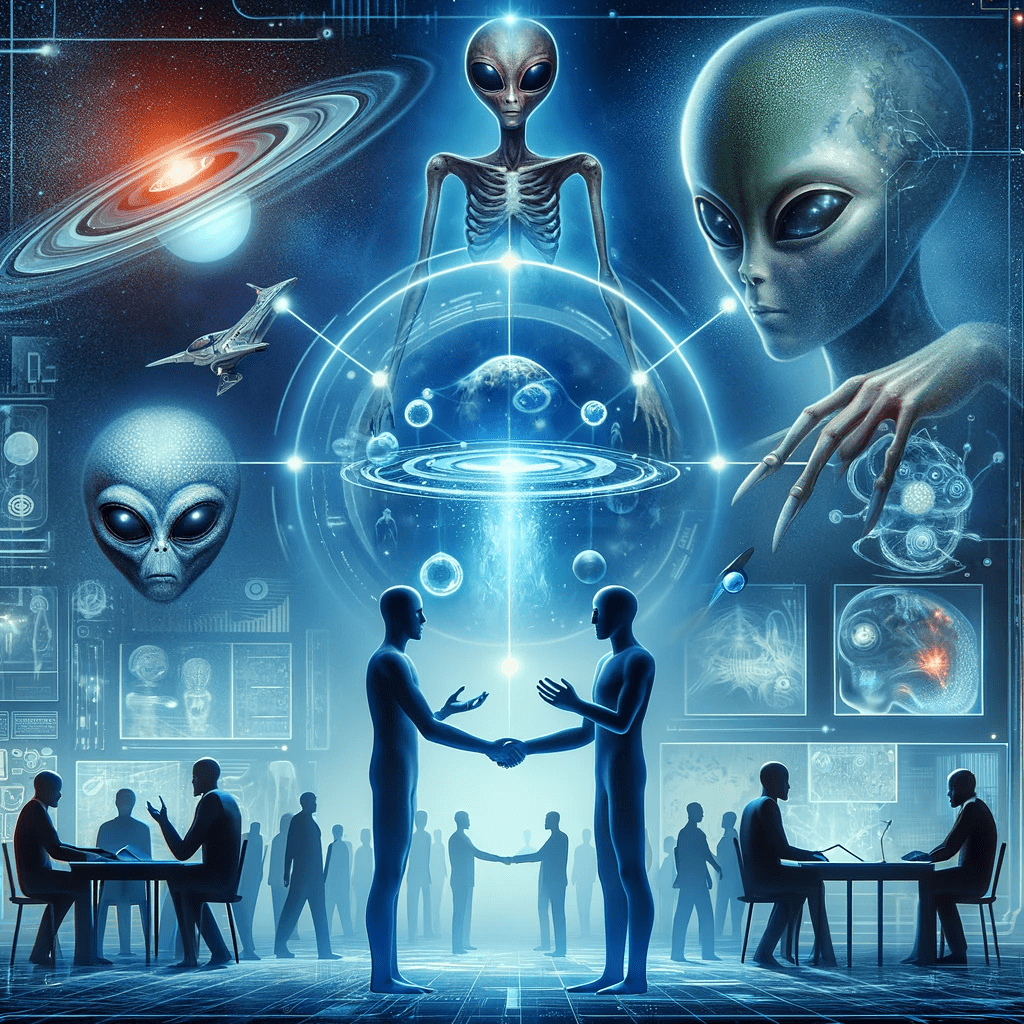The Agreement – Human Abductions and Experimentation in Exchange for Non-Human Technology

The possibility of secret agreements between global superpowers and extraterrestrial beings is one such narrative, fraught with intrigue and high stakes. Central to this speculation is ‘The Agreement’, a supposed exchange of humans for advanced non-human technology.
From my perspective, the abductions and subsequent experimentation are chilling realities, with both physical and psychological ramifications that echo far beyond the incidents themselves. This narrative, in my case, isn’t speculative – it’s a distressing personal chronicle of unidentified phenomena.
As an abductee, my firsthand experiences often feel dismissed or invalidated when confronted with such a critical approach.
The existence of extraterrestrial life or non-human entities and their potential technological prowess resonates deeply. It reinforces a belief that, while my experiences might seem extraordinary to the majority, they are not beyond the realm of possibility. The Fermi Paradox, UAP reports, and the idea of technologically superior civilizations do align with what I’ve experienced, presenting a framework within which my encounters could be rationalized.
Yet, as an abductee, I find the portrayal of ‘The Agreement’ challenging. On the one hand, it’s true that assuming extraterrestrials share a transactional approach to knowledge acquisition is anthropocentric. Still, it seems equally anthropocentric to assume they wouldn’t, or that our species holds no value for study.
I’ve asked myself countless times, why would any entity – human or non-human – conduct such abductions, and why would our leaders permit it?
Do extraordinary claims require extraordinary evidence? As an abductee, it’s a challenge I face – how to provide evidence for something so inherently elusive and not reproducible. While I may not have this evidence, what I do have is my story, my experiences, and the hope that one day, a more comprehensive understanding of these phenomena will emerge.
The search for answers, must continue, as much for me as for all of humanity. Yet, this exploration should extend beyond just scientific inquiry, to include personal narratives and experiences. Only then might we approach a more holistic understanding of our place in the cosmos, and, perhaps, validate experiences like mine.
The concept of ‘The Agreement’ essentially suggests that clandestine deals have been established between governments or elite human factions and extraterrestrial entities. The purported exchange involves humans being ‘given’ to these entities for research or experimentation purposes. In return, advanced non-human technology, far beyond human comprehension and capability, is allegedly provided.
To consider the plausibility of such an arrangement, one must examine the two major components involved: the existence of intelligent extraterrestrial life and the ability of these entities to develop technology beyond our comprehension.
The scientific community acknowledges the mathematical probability of their existence, given the vast number of potentially habitable planets in the cosmos. Theoretical physicist Enrico Fermi famously encapsulated this paradox, questioning, “Where is everybody?”
The Pentagon’s report on Unidentified Aerial Phenomena (UAPs) in 2021 revealed encounters with objects demonstrating advanced flight capabilities, reigniting the debate around potential alien technology.
As for the idea that extraterrestrials might possess technology that far surpasses ours, this concept is not entirely beyond reason. If an alien civilization existed for millions or billions of years longer than humanity, their technology could indeed be incredibly advanced. Renowned physicist Michio Kaku’s theories on Type I, II, and III civilizations provide a framework to imagine such advancement, where a Type III civilization can harness energy from its entire galaxy.
‘The Agreement’ requires one to accept that such entities would have a desire or need to study humans and, furthermore, that they would be willing to trade their advanced technology in return. It also presupposes that these extraterrestrial entities share a transactional approach to exploration and knowledge acquisition, a distinctly human characteristic.
‘The Agreement’ assumes a moral flexibility within our leadership, who would have to accept the abduction and experimentation of humans. While not entirely implausible given the historical precedent of unethical human experimentation, it’s a bold assertion requiring solid evidence.
The notion of ‘The Agreement’ may seem outlandish to some, yet it’s not entirely without historical precedent – at least in terms of clandestine operations involving governments and their often unsuspected activities. History is littered with instances of secret pacts, covert operations, and undisclosed experiments conducted under the veil of national security or scientific advancement. The Manhattan Project, a top-secret initiative leading to the development of nuclear weapons during World War II, serves as one prominent example. Another is the Tuskegee Syphilis Study, which showed a shocking disregard for human rights in the name of science. Covid – which we are all well aware, can also be added to this list.
It appears that hundreds of exotic vehicles have been captured and are being studied by various world governments.
These cases, demonstrate that concealment of morally dubious or outright unethical actions isn’t beyond the realm of governmental conduct.
Beyond the Fermi Paradox and Kaku’s civilization types, several other scientific theories and principles can be drawn upon when discussing the plausibility of ‘The Agreement’ and the existence of advanced extraterrestrial life. For instance, the Drake Equation, formulated by astronomer Frank Drake, attempts to estimate the number of active, communicative extraterrestrial civilizations in the Milky Way galaxy. The Zoo Hypothesis, proposed by MIT radio astronomer John A. Ball, suggests that advanced extraterrestrial civilizations exist and are aware of us but deliberately avoid contact, similar to zookeepers with animals.
Are we alone, or are we part of a cosmic network beyond our comprehension? Do we stand as isolated observers, or are we unwitting participants in interstellar politics? I really hope that I wasn’t used by factions of the Government or Military Industrial Complex as a trading card in exchange for some new technology.

